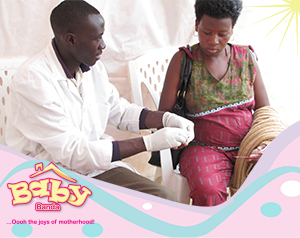HIV testing is recommended for all pregnant women to prevent Mother-to-Child transmission of HIV which is the passing of HIV from a woman infected with HIV to her baby during pregnancy, during labour and delivery, or by breastfeeding. A mother who knows early in her pregnancy that she is HIV infected has more time to make important decisions. She and her health care provider will have more time to decide on effective ways to protect her health and prevent mother-to-child transmission of HIV. She can also take steps to prevent passing HIV to her partner.
Testing for HIV
The most common HIV test is the HIV antibody test. HIV antibodies are a type of protein the body produces in response to HIV infection. An HIV antibody test looks for HIV antibodies in a person’s blood, urine, or fluids from the mouth. When a person has a positive result from an HIV antibody test, a second and different type of antibody test is done to confirm that the person is indeed infected with HIV. The second test is called a confirmatory HIV test. To be diagnosed with HIV, a person’s confirmatory HIV test must also be positive.
Pregnant women who test positive for HIV have many options to stay healthy and protect their babies from becoming HIV infected. Health care providers recommend that women infected with HIV take anti-HIV medications to prevent mother-to-child transmission of HIV and, if needed, for their own health. If you are diagnosed with HIV, your health care provider will answer your questions about HIV and discuss ways to help you and your baby stay healthy. Together you can make decisions about HIV care during your pregnancy.
In Kenya there are guidelines by the Ministry of health for antenatal care and prevention of mother-to-child transmission during pregnancy period and can be summarized as below:
• All pregnant women of unknown HIV status should be offered opt-out testing at the first ANC visit. This means that HIV testing is automatically included as part of routine prenatal care.
• Repeat HIV testing (After 3 months) in the third trimester should be offered to all women whose first antenatal test was performed before 28 weeks gestation.
• Women who decline HIV testing at the first antenatal visit should have follow-up counselling at subsequent visits and offered HIV testing.
• Women presenting in labour without documented HIV testing should have opt-out testing done urgently.
• All facilities providing antenatal and maternity care must-have capability for providing HIV testing at all hours of operation.
• Postnatal HIV counselling and testing should be offered to all women with unknown HIV status.













